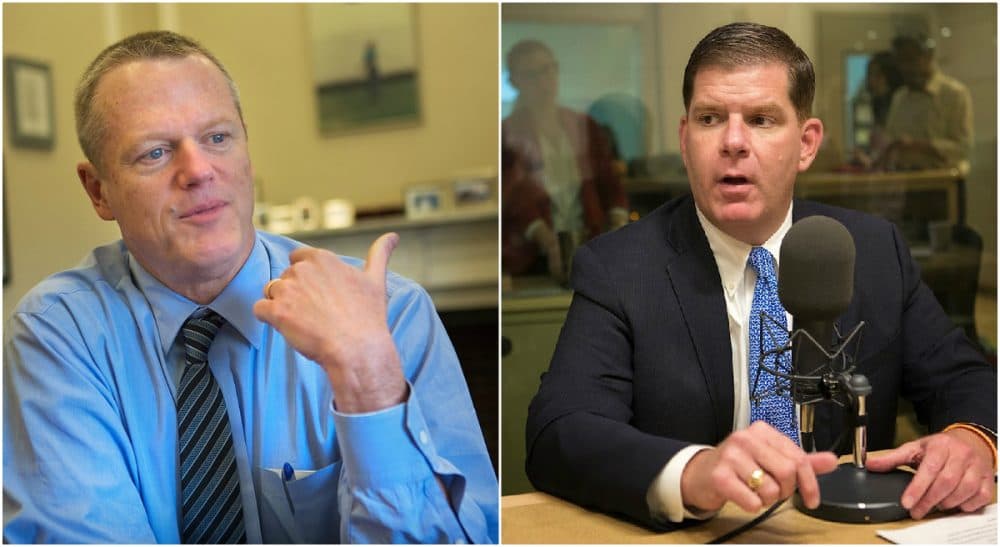Advertisement
Politicians And Privacy: Why Text Messages Should Be Off Limits

First Boston Mayor Marty Walsh refuses to make public his text messages and then, a few weeks later, Gov. Charlie Baker follows suit. Good government types are in a tizzy. Texts should be public documents, they cry, the same as any other written records. Openness and transparency are the enemies of corruption and back-room dealing.
The two men are right to resist. As much as we like to deride them, even politicians have some right to privacy. Moreover, and most importantly, good government depends not only on openness, but also on privacy: Governance itself is better if elected officials can say and speak their minds, unfettered by the fear that every offhand, casual remark is grist for the public mill.
Governance itself is better if elected officials can say and speak their minds, unfettered by the fear that every offhand, casual remark is grist for the public mill.
The mini-scandal developed over the last two months, spurred by journalists who had made requests to City Hall for Walsh’s text messages — first for those relating to Boston’s doomed Olympic bid and then, more broadly, for pretty much everything. In August, Walsh said no. The mayor offered up some fatuous excuses for why (a lack of “technical capacity”) but in likelihood Walsh — like Tom Brady in DeflateGate — just didn’t want to release messages he thought private and potentially embarrassing. And just last week, Baker also declined to release his texts, asserting the governor’s office is exempt from the state’s public records law.
That law is what’s at issue. Written before the advent of the digital age, it — like other similar laws around the country — rests on one big distinction. Written documents are considered public records. Oral communications are not. Thus, a letter from a pol to a constituent is a public record. But a phone call to that same constituent about exactly the same subject is not.
Why the difference?
One reason may be technological: Back when the law was enacted, it was easier to keep paper records than to somehow monitor and record oral communications. But while that may have been once true, these days, it’s not. With a little help from, say, the NSA, it should be easy to set up a system monitoring, recording and even transcribing every phone call a politician makes. Indeed, it might even be feasible to demand (as many do of cops) that politicians wear body cameras recording and transcribing whatever they might say.
If you’re not exactly comfortable with that idea, horrified perhaps at the invasion of privacy, consider another reason we distinguish between paper and oral communications. There’s a general sense that a document is more formal and well-thought-out, something that has received a measure of consideration and stands as a record of how a decision is being made. Moreover, documents are things we generally maintain for a long time. In a sense, we intend for them to be read by others and — when it comes to government — those others should include ordinary citizens.
Oral communications are different: extemporaneous, casual, often ill-considered or carelessly expressed. In a conversation, people will banter, bounce ideas off of each other, and test out theories, sometimes saying things they never would put in a written document.
If you buy into the merits of that distinction — paper documents are public, while oral communications are private — then the question arises: Are emails, texts and other forms of electronic communication really the same as traditional paper documents? Or are they more like oral communication?
Granted, texts and emails are "written" (although, with text-to-speech and speech-to-text processing, that’s increasingly less true). And right now, the public records law makes no distinction between paper and electronic (and for good reason: a report in PDF truly is no different from the same report on paper). But on a day-to-day basis, emails and especially texts really function as a kind of oral communication. They are just a different way of having a conversation.
And what happens if we insist that texts are public documents? Politicians will simply stop text messaging.
Indeed, they are a better way to have a conversation. Phone calls are hard to set up and tend to drag on. There are the opening pleasantries, the settling down to business, and then the awkward efforts to ring off. Texting has none of those problems. In the hands of technologically-savvy politicians, it becomes a rapid and efficient way of chatting back and forth with a wide variety of people. Good politicians rely on information from myriad sources to figure out what is going on and how they should react. Texting helps them get all of that information.
And what happens if we insist that texts are public documents? Politicians will simply stop text messaging. That, in effect, is what the late Boston Mayor Tom Menino did. Notorious for refusing to even use email, Menino wasn’t a technophobe; he just wanted his communications to be private. But to put that burden on all other politicians — to say that they can’t take advantage of modern technology to better do their jobs — would be foolish.
Text messages as public records? As a texter might say: TMI.
